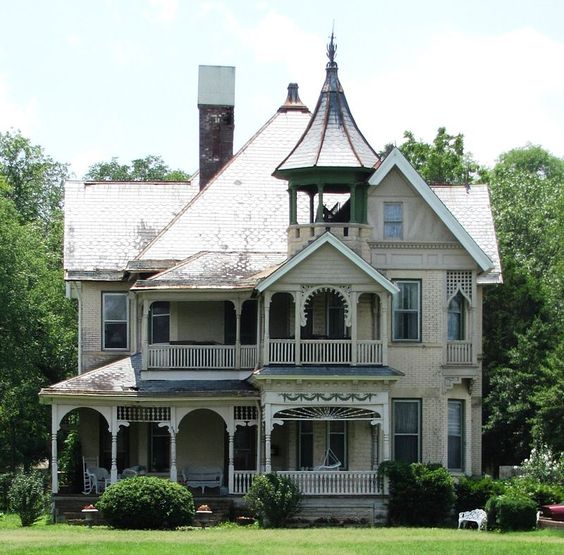
The T. G. Henderson House (also known as the Henderson-Marcello House) is a historic house located at 207 South Marion Street in Lake City, Florida. It is locally significant as an excellent example of the later, more developed phase of the Eastlake style, the house has an abundance of exterior ornamentation and an attention to surface detail characteristic of the period just prior to the transition into Shingle Style.
Description and history
The exterior fabric of the house is clapboard with corner boards on the principal corners. In addition, shingling was used beneath the balconies and in the gables, being laid in an imbricated pattern and in alternate rows laid with staggered butts. The turret, which grows out of the southernmost gable, is open on its four northern planes. The original plans called for cresting along the ridge of the westernmost roof section, but this has subsequently been removed. There are two chimneys located at the back of the hipped roof which serve all interior fireplaces. They are both brick and have corbelled courses forming a Gothic Revival cap. The roofs are hipped and gabled and there is currently a galvanized tin covering over it.
It was added to the National Register of Historic Places on July 24, 1973.

The I.W.P. Buchanan House stands as a testament to both architectural grandeur and historical significance in Lebanon, Tennessee, United States. Built circa 1894, this distinguished residence was commissioned for Isaac William Pleasant Buchanan, a figure deeply intertwined with academia and community development in his era.
Isaac Buchanan hailed from a family with academic roots. His father, Dr. Andrew H. Buchanan, held the prestigious position of chair within the Department of Mathematics at Cumberland University, a beacon of education in the region. Drawing from this academic legacy, Isaac Buchanan himself pursued a career in education, teaching Mathematics at Lincoln College in Illinois. However, his contributions extended far beyond the classroom.
A visionary and community leader, Isaac Buchanan played a pivotal role in the establishment of the Castle Heights Military Academy in Lebanon. This institution not only provided education but also instilled values of discipline and leadership in its students. Buchanan’s dedication to education and his commitment to the betterment of his community underscored his profound influence in Lebanon’s cultural and educational landscape.

The architectural splendor of the I.W.P. Buchanan House owes much to the creative genius of George Franklin Barber, a prominent architect renowned for his contributions to the American architectural scene. Embracing the Queen Anne architectural style, Barber infused the residence with intricate detailing, asymmetrical facades, and ornate embellishments characteristic of the era. The house stands as a testament to Barber’s mastery, showcasing his ability to blend elegance with innovation.
In recognition of its architectural and historical significance, the I.W.P. Buchanan House was rightfully included in the National Register of Historic Places on January 8, 1979. This prestigious designation not only honors the legacy of the Buchanan family but also underscores the importance of preserving Lebanon’s rich cultural heritage for future generations to cherish and appreciate.

As visitors step onto the grounds of the I.W.P. Buchanan House, they are transported back in time, enveloped by the aura of bygone eras and the echoes of a vibrant past. Each architectural detail, each historical artifact tells a story—a story of resilience, vision, and the enduring spirit of community.
In essence, the I.W.P. Buchanan House serves as more than just a physical structure; it is a living testament to the indelible mark left by those who came before us. It stands as a beacon of inspiration, urging us to honor our past while embracing the promise of the future—a promise built upon the foundations of knowledge, innovation, and unwavering dedication to the greater good.
